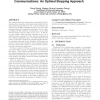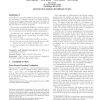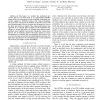245 search results - page 30 / 49 » A low power scheduler using game theory |
107
Voted
MOBIHOC
2007
ACM
16 years 4 days ago
2007
ACM
We consider distributed opportunistic scheduling (DOS) in wireless ad-hoc networks, where many links contend for the same channel using random access. In such networks, distribute...
PODC
2004
ACM
15 years 6 months ago
2004
ACM
Secure function evaluation (SFE) enables a group of players, by themselves, to evaluate a function on private inputs as securely as if a trusted third party had done it for them. ...
99
Voted
WIMOB
2008
IEEE
15 years 7 months ago
2008
IEEE
—One popular solution for reducing the resource consumption of Intrusion Detection System (IDS) in MANET is to elect a head-cluster (leader) to provide intrusion detection servic...
73
Voted
VTC
2006
IEEE
15 years 6 months ago
2006
IEEE
Abstract— In this paper, we consider the unclaimed subcarriers that no user feeds back in an opportunistic OFDMA system with a per sub-carrier power constraint. Unclaimed subcarr...
122
click to vote
CCR
2004
15 years 12 days ago
2004
The science of network service composition has emerged as one of the grand themes of networking research [17] as a direct result of the complexity and sophistication of emerging n...



